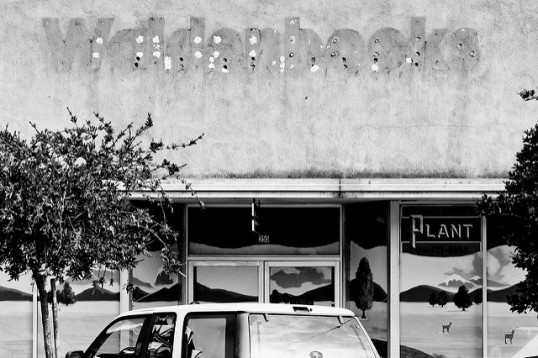For the record, by “reading” I mean “reading more than just the inflammatory headline and then sharing it to display your sense of moral outrage and to ‘prove’ your point.”
I came along at a particularly lucky time in American history. Despite the fact that i grew up in a small-to-medium city in a moderate-to-conservative region, I always had access to good reading material and usually took advantage of that fact. It’s what helped me survive my teen years and make it to my senior year in high school (1982), which was the point where I realized for the first time that I could successfully invent the person I wanted to be and that I deserved better than the losers I’d been hanging around with up to that point. By the semester I graduated, I’d finally seen that it was OK to be smart and to have friends who were smart too.
A decade or so later, when Borders and Barnes & Noble became major retail forces, to criticize the way these chain bookstores were destroying local, independent stores. I was very conflicted about this because I remembered growing up in a place that didn’t really even have viable independent stores that sold the kind of books i wanted to be reading. Most of the independent stores around here were either religious in nature or were of the “books and stationery” variety, which meant that they sold primarily inconsequential and uncontroversial titles.

(Waldenbooks, Thomas Hawk, CC BY-NC 2.0)
In fact, it was the Waldenbooks branch at the mall where I found books about cities and about subcultures, and (gasp) books and magazines that told me it was OK to be the homosexual I was…ahem…practicing to be. Without the big chain store and its broader perspective, there’s no telling how long I would have had to wait to read messages that challenged the everyday bullshit of the early Reagan-era South. It’s all well and good to criticize the chain bookstores when you live in a big city located in a region with options. The chain were the only option here at the time, and I’d argue that stores like Borders and Barnes & Noble were extremely important in providing this function for the generation who came along in the pre-Internet 1990s.
Of course, the library was important as well. In the early 1980s, the Greensboro Public Library had a surprisingly large collection of titles from among the “gay liberation” classics of the early 1970s. When I look back at them now, I find a lot of this stuff sort of cringeworthy (though many of these books presented a much more open-minded and diverse notion of what a gay person could be than much pf the “gay culture” crap that followed) but it was precisely what I needed to be reading at the time. It goes without saying where this love for the library took me, although it was a rather long and circuitous route.
Reading (and realizing that doing so was a good thing) was also what prompted me to seek out used book stores like the original Browsery, which was on the second floor of a dumpy building near UNCG and only seemed to be open at night, and newsstands like the International in Charlotte, tucked away in the back of a mall hidden in an apartment complex off Providence Road. It was harder to find the things you needed then, but it was not impossible…assuming you cared enough to bother.
I’m sort of babbling and don’t really have much of a point here, I guess, other than to reiterate that I was luckier than a lot of people my age and older who grew up in less urban and bookish areas. My parents did not read a lot of books but did read a lot of everything else, so they were good role models. Being in a sort of college town (though not a college-dominated town) also helped. Having access, though, and the desire to seek things out, was the key.
There’s a lot of access now too, which is amazing and wonderful, but I wish there were more propensity to filter out the crap and be selective in a world with a major signal-to-noise deficit.